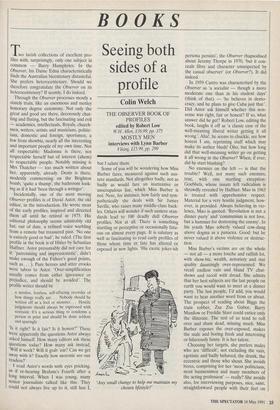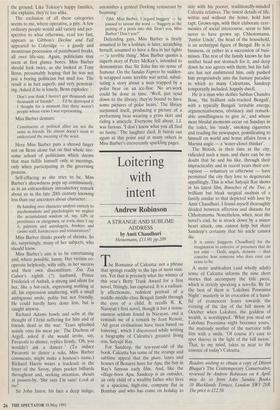BOOKS
Seeing both sides of a profile
Colin Welch
THE OBSERVER BOOK OF PROFILES edited by Robert Low W.H. Allen, f16.99, pp. 375 MOSTLY MEN interviews with Lynn Barber Viking f15.99, pp. 299 Two lavish collections of excellent pro- files with, surprisingly, only one subject in common — Barry Humphries. In the Observer, his Dame Edna characteristically finds the Australian bicentenary distasteful. She prefers heterocentenary. Should we therefore congratulate the Observer on its heterocentenary? If seemly, I do indeed.
Through the Observer processes mostly a stately train, like an enormous and motley honorary degree ceremony. Not only the great and good are there, decorously chat- ting and fluting, but the fascinating and evil — academics, intellectuals, Royals, church- men, writers, artists and musicians, politic- ians, domestic and foreign, sportsmen, a few from showbiz, nearly all the interesting and important people of my own time. Not all respectable: Madonna is there, not respectable herself but of interest (ahem) to respectable people. Notably missing is Mrs Thatcher — too much written about her, apparently, already. Denis is there, modestly commenting on the Brighton bomb, 'quite a thump', the bathroom look- ing as if it had 'been through a wringer'.
Incidentally, one of the most moving Observer profiles is of David Astor, the old editor, in the introduction. He wrote most of the early profiles, inspired and directed them all until he retired in 1975. His editorial philosophy seems admirably old hat, out of date, a refined voice warbling from a remote but treasured past. 'No one is entirely good or bad', he ruled. (The first profile in the book is of Hitler by Sebastian Haffner. Astor presumably did not care for it: 'patronising and impressionistic', didn't make enough of the Fiihrer's good points, such as. . . ). Pure heroes and utter crooks were taboo to Astor. 'Over-simplification usually comes from either ignorance or prejudice, and should be avoided'. The profile writer should be
a modest, fearless, self-effacing recorder of how things really are... Nobody should be written off as a fool or monster... Hostile judgments should always be expressed with restraint. It's a serious thing to condemn a person in print and should be done seldom and sparingly.
`Is it right? Is it fair? Is it honest?' These were apparently the questions Astor always asked himself. How many editors ask these questions today? How many ask instead, Will it work? Will it grab 'em? Can we get away with it? Exactly how moronic are our readers?'
I read Astor's words with eyes pricking, as if re-hearing Brahms's Fourth after a long interval. When I was young, many senior journalists talked like this. They could not always live up to it, still less I, but I salute them.
Some of you will be wondering how Miss Barber fares, measured against such aus- tere standards. Not altogether badly, not as badly as would fare an inattentive or unscrupulous liar, which Miss Barber is not. Note, for instance, how fairly and sym- pathetically she deals with Sir James Saville, who raises many middle-class hack- les. Others will wonder if such austere stan- dards lead to 100 deadly dull Observer profiles. Not at all. There is something startling or perceptive or occasionally fatu- ous on almost every page. It is salutary as well as fascinating to read early profiles of those whom time or fate has altered or exposed in new lights. 'His exotic joker-ish `Any small change to help me maintain my chosen lifestyle?' persona persists', the Observer rhapsodised about Jeremy Thorpe in 1970, tut it con- ceals fibre and character unsuspected by the casual observer' (or Observer?). It did indeed.
In 1959 Castro was characterised by the Observer as 'a socialist — though a more moderate one than in his student days' (think of that) — 'he believes in demo- cracy, and he plans to give Cuba just that'. Did Astor ask himself whether this non- sense was right, fair or honest? If so, what answer did he get? Robert Low, editing the book, laughs it off as 'a classic case of the well-meaning liberal writer getting it all wrong'. Aha!, he seems to chuckle, see how honest I am, reprinting stuff which may make its author blush! Oho, but how long did that well-meaning writer go on getting it all wrong in the Observer? When, if ever, did he start blushing?
No enemies on the left — is that the trouble? Well, not many such enemies, true, with one startling exception: Goebbels, whose innate left radicalism is shrewdly revealed by Haffner. Mao in 1963 is treated with apprehensive respect. Material for a very hostile judgment, how- ever, is provided. Always believing in vio- lence, Mao is quoted: 'Revolution is not a dinner party' and 'communism is not love, but a hammer for destroying the enemy'. In his youth Mao soberly valued cow-dung above dogma as a panacea. Good: but he never valued it above violence or destruc- tion.
Miss Barber's victims are on the whole — not all — a more louche and raffish lot, with show-biz, wealth, notoriety and star quality dauntingly over-represented. We recall endless vain and bland TV chat- shows and recoil with dread. She admits that her best subjects are the last people on earth you would want to meet at a dinner party. The last people, I'd add, you would want to hear another word from or about. The prospect of reading about Biggs the train robber, Zsa Zsa Gabor, Barry Manilow or Freddie Starr could entice only the illiterate. The rest of us tend to roll over and sham dead, missing much. Miss Barber exposes the over-exposed, makes the stale and boring fresh and interesting or hilariously funny. It is her talent.
Choosing her targets, she prefers males who are 'difficult', not excluding the vain, egotistic and badly behaved, the drunk, the eccentric and those who shout. She avoids bores, comprising for her 'most politicians, most businessmen and many members of the acting profession' — really? She avoids also, for interviewing purposes, nice, sane, straightforward people with their feet on the ground. Like Tolstoy's happy families, she explains, they're too alike.
The exclusion of all these categories seems to me, where operative, a pity. A few ordinary people would add variety and per- spective to what otherwise, read too fast, appears as Gibbon's Decline and Fall appeared to Coleridge — a gaudy and monstrous procession of pasteboard freaks, all over life-size. Again, politicians may seem at first glance bores. Miss Barber should look twice, as she looked at Tony Benn, presumably hoping that he was not just a boring politician but mad too. The result is in fact superb, and very penetrat- ing. Asked if he is lonely, Benn explodes:
Don't you think I haven't got thousands and thousands of friends? .. . I'd be destroyed if I thought for a moment that there weren't people whose views I was representing.
Miss Barber demurs:
Constituents or political allies are not the same as friends. He almost doesn't seem to understand the meaning of the word.
Here Miss Barber puts a shrewd finger not on Benn alone but on that whole tire- some school of politicians which deems that man fulfils himself only at meetings, only when participating in the governing process.
Self-effacing as she tries to be, Miss Barber's shrewdness pops up continuously, as in an extraordinary introductory remark about us in the late 20th century knowing less than our ancestors about character:
By handing over character analysis entirely to psychoanalysts and psychologists we neglect the accumulated wisdom of, say, GPs or prostitutes or clergymen, or even, dare I say it, palmists and astrologers, bookies and casino staff, hairdressers and restaurateurs? Miss Barber thinks poorly of shrinks. So do, surprisingly, many of her subjects, who should know.
Miss Barber's aim is to be entertaining and, where possible, funny. Her victims co- operate helplessly, willy nilly, in her success and their own discomfiture. Zsa Zsa Gabor's eighth (?) husband, Prince Frederick of Anhalt, is strong and silent for her, like a hat-rack, expressing nothing at all, his expression unaltering, with a small ambiguous smile, polite but not friendly. He could hardly have done less, but is caught anyway.
Richard Adams howls and sobs at the thought of Christ suffering for him and of friends dead in the war: 'Tears splashed noisily onto his meat pie.' The Duchess of Argyll, asked if she would invite, say, Pavarotti to dinner, replies firmly, 'Oh, you wouldn't ask a dancer .' (To induce Pavarotti to dance a solo, Miss Barber comments, might make a hostess's name.) Richard Harris wears a tracksuit in the foyer of the Savoy, plays pocket billiards throughout and, seeking attention, shouts at passers-by, 'She says I'm vain! Look at me!'
Sir John Junor, his face a deep indigo, astonishes a genteel Dorking restaurant by booming:
'Filth, Miss Barber. I regard buggery' — he paused to savour the word — 'buggery as the putting of a penis into shit. Don't you, Miss Barber? Don't you?'
Defending gays, Miss Barber is firstly assumed to be a lesbian, is later, scratching herself, assumed to have a flea in her tights — 'a terrible thing'. Miss Barber quotes a superb story of Peter McKay's, intended to demonstrate that Sir John has no sense of humour. On the Sunday Express he sudden- ly scrapped some terrible war serial, substi- tuting a story about a man trapped by a polar bear on an ice-floe. No art-work could be done in time. 'Well, just send down to the library, they're bound to have some pictures of polar bears.' The library surpassed itself, producing a picture of a performing bear wearing a grass skirt and riding a unicycle. Everyone fell about. J.J. was furious. 'I don't know what you all find so funny.' The laughter died. It bursts out again at this point and at many others in Miss Barber's irreverently sparkling pages.



























































 Previous page
Previous page